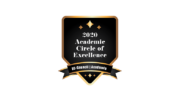By Matt Arnold, Digital Learning Manager, and Sherri Parker, Director of Curricular Innovation & Development
A team of three talented ECPI University Computer Information Systems graduates are using their programming skills to develop a variety of responsive, web-based learning experiences to support digital learning at ECPI University, including a virtual eCity. The team, led by Digital Learning Manager Matt Arnold, includes Game Developers Frank Van Sant and Justin Mariner, as well as Academic Technology Specialist Thomas Baird. This group has collaborated with faculty members and deans to create and deploy roughly twenty animated video tutorials, digital learning games, and work experience simulations throughout ECPI University’s computer and information science, electronics engineering technology, culinary arts, and mechanical engineering technology programs in 2020.
Justin, a 2018 graduate, was the lead programmer for a unique, custom-built integration that allows Unity software and the Canvas learning management system to communicate with each other, setting ECPI University apart from other institutions in its ability to deliver 2D and 3D simulated learning experiences. Unity is one of the world’s leading platforms for creating and operating interactive, real-time 3D content. This state-of-the-art integration allows students to practice their programmatic skills in a simulated environment and then receive instant feedback. Grades are automatically returned to Canvas.

Additionally, Justin’s coding skills were used to create a custom App Selection Tool that facilitates the deployment of digital content into Canvas quickly and efficiently. Changes to simulations can be made centrally, automatically, and updated in all associated courses at once. The tool also allows for managing version control for each asset. Version control is the practice of tracking and managing changes to software code, allowing users to manage changes to source code over time. This is important because it allows for multiple versions of an experience (simulation, game, etc.) within a course (different versions from week-to-week) and across courses (different versions of an experience for different courses). This App Selection Tool also supports ECPI University’s eHospital web deployment, allowing grades to be automatically sent from Unity to the Canvas gradebook.
Frank, a 2018 graduate, has leveraged his skills to design and build the new ECPI Virtual City which provides scenarios and context around specific skills students practice in digital simulations. Using various optimization techniques, Frank brought high-quality cityscape visuals to a web experience. Frank also builds custom models to meet the unique needs of each development project. He leads the team’s designing phase for projects based on established criteria and constraints.

Another feature of the App Selection Tool allows faculty members, deans, or developers to upload data files that can automatically create a new variation of the simulation or learning game. Enabling the instructors to adjust the simulation on-the-fly allows for an even more robust student learning experience. All of the App Selection Tool functionality sets ECPI University apart from other higher education institutions in its ability to load content into Canvas.
Thomas, a 2015 graduate, uses his programming skills to develop the user interface components within digital learning experiences. He ensures projects include clear instructions for learners and easy-to-use navigation displays. He builds other interactive assets for courses using web technologies and authoring tools as well. His expertise with digital learning systems helps the team develop a seamless student experience between each system.

As the digital learning team continues to develop future simulations and learning games for ECPI University students, they will explore opportunities to build immersive experiences using augmented reality, innovative web technologies, and game development engines. Now that the team has a firm infrastructure deployed, development of new digital learning experiences will be even more efficient, allowing faculty and instructional development managers to instantly customize their own versions of online learning games and simulations.








Be the first to comment on "ECPI University Grads Lead the Nation in Higher Education Digital Learning Development"